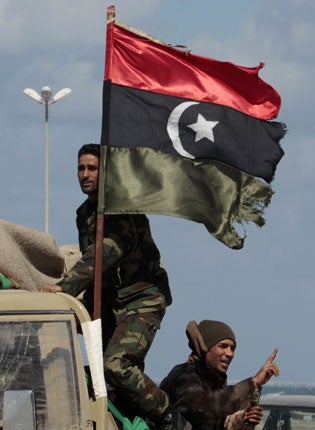Growing unease over path ahead in the capital of 'Free Libya'

Your support helps us to tell the story
From reproductive rights to climate change to Big Tech, The Independent is on the ground when the story is developing. Whether it's investigating the financials of Elon Musk's pro-Trump PAC or producing our latest documentary, 'The A Word', which shines a light on the American women fighting for reproductive rights, we know how important it is to parse out the facts from the messaging.
At such a critical moment in US history, we need reporters on the ground. Your donation allows us to keep sending journalists to speak to both sides of the story.
The Independent is trusted by Americans across the entire political spectrum. And unlike many other quality news outlets, we choose not to lock Americans out of our reporting and analysis with paywalls. We believe quality journalism should be available to everyone, paid for by those who can afford it.
Your support makes all the difference.Huddled over a table, a man carefully applies the finishing touches to an unflattering portrait of Muammar Gaddafi. With his unruly hair, broad jaw and drooping eyes, the reviled dictator is a caricaturist's dream.
At the "Free Libya" headquarters, the walls are now festooned with pictures of Colonel Gaddafi: some depict the glowering leader with horns, others with fangs, and one as a gorilla scratching the back of his son, Saif. Irreverent and slightly malicious, the images encapsulate the spirit of a people liberated from a 42-year dictatorship.
It was here in front of the courthouse, facing the Mediterranean, that peaceful protests against the regime started, culminating in a bloody battle for control of Benghazi, the regional capital of the east. But the protesters' initial euphoria is giving way to frustrations and doubts as the Libyan leader proves difficult to shift.
As Hefa, a Benghazi architect, puts it: "I told my parents at the beginning: either he [Gaddafi] will go in one week, or this country will be divided." A divided Libya is the opposition's nightmare, the rebels claim. Posters proclaim: "Libya one body, Tripoli its heart."
Indeed, walking along the promenade, one might find it difficult to believe that Benghazi residents fear failure. The atmosphere is festive. Volunteers thrust sandwiches into the hands of passers-by, Libyans drape the revolutionary flag around their shoulders, while children crawl over an abandoned tank – all this against a constant refrain of over-excited gunfire.
But against this backdrop, there is an undercurrent of unease. There are those who view this as a fight to the death – Colonel Gaddafi is not a man to view betrayal kindly – while others, mainly the wealthier classes, see their lifestyles slipping away from them as the city descends into chaos.
Shops remain largely shuttered while banks operate on a skeleton timetable. Schools and universities remain closed.
A large number of people are now armed, and the city has been flooded with criminals let loose after the prisons were opened, allegedly by the regime. Eastern Libya may have been freed, but there are still few jobs, money is getting scarce and there is certainly little security.
Speculation is mounting that regime supporters in Benghazi who have kept a low profile are gaining in confidence.
When a massive explosion at a munitions dump near Benghazi killed at least 17 firefighters at the weekend, locals immediately jumped to the conclusion that it was the work of regime loyalists.
Just a few kilometres from the scene of the explosion, emotions were running high. When Western journalists attempting to get close to the scene of the blast refused to follow an escort into an unlit side street, the driver of the front vehicle shouted: "If you don't follow me, I'll shoot you!"
An incident was averted, but it was clear that hostility is on the rise. With the eyes of the world now focused on Libya, some feel frustrated that there is still no international reaction. The West has not answered the opposition's appeal for targeted air strikes against regime strongholds. "The Europeans and the United States – what are they waiting for?" asks Najah Kablan, a school inspector. "When they wanted to [get rid of Iraqi leader] Saddam [Hussein], they acted immediately. What are they waiting for?"
Join our commenting forum
Join thought-provoking conversations, follow other Independent readers and see their replies
Comments